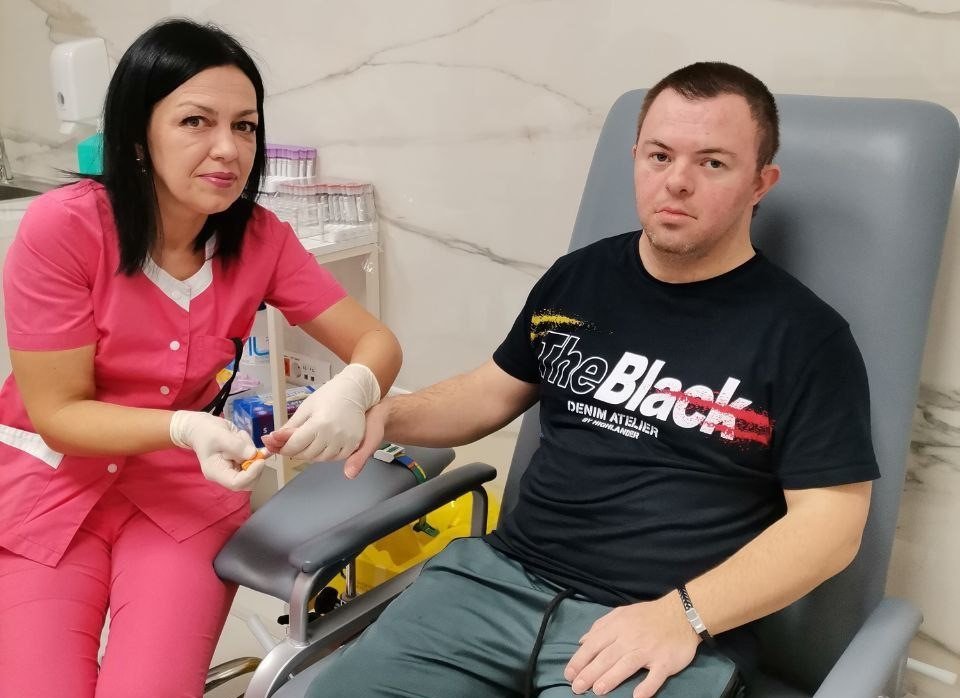The main demand of the Republic Centre – PORAKA in the area of healthcare in the past 20 years has been for the state to provide free of charge health care, medical treatments and medication for all persons with intellectual disability without limiting the age to 26 years. After numerous advocacy activities (including the initiative submitted in 2013 to the Constitutional Court for assessing the constitutionality of the limitation of exemption from participation when using healthcare services only for children with disability up to 26 years of age), finally on 18th of July 2023, the Assembly of the Republic of North Macedonia adopted an amendment to the Law on Health Insurance that allows adults with intellectual disability to use healthcare services without the obligation to pay participation fee.
Unfortunately, the realization of this right for persons with intellectual disability above 26 years of age, has been implemented with difficulties in the past two years and large number of persons, especially those with moderate intellectual disability are unfoundedly rejected by the Centres for Social Work, which represents an unlawful violation of their rights.
The Republic Centre – PORAKA continuously reacted in the past two years to the Ministry of Social Policy, Demographic and Youth and the Social Inspection within this Ministry to provide unhindered realisation of this right.
The last reaction was made in April 2025 to the Department for Protection and Employment of Persons with Disability and Protection of Elderly at the Sector for Social Protection and to the Cabinet of the Minister, alongside with copies of unfounded rejections of persons with intellectual disability who have applied for realisation of this right at the Centres for Social Work.
The reaction included instructions given from officials at the Ministry to all Centres for Social Work in the country, which stated that persons with severe and profound intellectual disability exercise the right to free healthcare as beneficiaries of the Disability Allowance, while persons with moderate intellectual disability should exercise this right as beneficiaries of the Allowance for help and care from another person. Despite such instruction from the Ministry, it remains unclear why Centres for Social Work are challenging this right for persons with moderate intellectual disability and are rejecting their requests by issuing unsuitable statements. The Republic Centre – PORAKA has not received an official response from the Ministry of Social Policy, Demographic and Youth to the last reaction so far.
Priorities and recommendations of the Republic Centre – PORAKA in healthcare and health insurance
The other priorities and recommendations of the Republic Centre – PORAKA in healthcare and health insurance:
- It is essential to make revision of the positive list of medicines and ensuring availability of medicines needed for children/persons with intellectual disability. Also, in the area of medicine procurement, it is necessary to facilitate and accelerate the refunding procedure at the Health Insurance Fund.
- When needed, the family doctor of the patient with intellectual disability should recommend accompany person during hospitalisation, without age restrictions, in order to successfully achieve the necessary healthcare.
- It is essential to develop services, programmes and prevention services, early detection, diagnosis and early intervention, upon detection of atypical development of newborns, as well as monitoring, treatment and rehabilitation.
- Adequate support to persons with intellectual disability and their families through information, education and training in the area of healthcare.
- Providing universal availability to all necessary healthcare services for persons with disability (including sexual and reproductive health), training of healthcare professionals in a human rights-based approach to persons with disability, as well as informing, educating and reducing prejudice among medical personnel.



